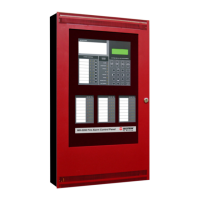14
Editing MHI Databases
2.3.12 Enforce Local LED Rules
The Enforce Local LED Rules check box forces an LED on an input's panel be related.
Normally an LED anywhere in the system is all that is required. Note: The common LEDs of
any panel are based upon the zone LEDs that are displayed by the panel, not based upon the
inputs to the panel.
2.3.13 Enforce Group Association
The Enforce Group Association checking check box enables MHI to check to see if a group
association has been included in the relates of inputs.
2.3.14 Observe Daylight Savings Time
The Observe Daylight Savings Time check box enables or disables the automatic changing of
the clock for Daylight Savings Time. If enable, the system moves 1 hour ahead the second
Sunday of March and fall back 1 hour the first Sunday of November (North American dates).
2.3.15 Pre-Alarm Buzzer
The Pre-Alarm Buzzer, when enabled, will cause a tone to sound when an addressable device
is in alarm during the Retard period. The tone is a triple beep repeated every second.
2.3.16 Master ID
Master ID defines which panel in a network acts as the Master panel. Only control panels may
be chosen as the Master panel. The Master panel retains an alarm list for the entire network
and synchronizes the date and time on all panels and annunciators at 3:30am everyday. (The
alarm list functionality is programmable for several modes of operation. See below for more
detail.)
2.3.17 Alarm List Mode
Alarm List Mode sets the way the Alarm List messages are displayed on fire panels in the
system. Annunciators always receive messages as marked in the database. There are three
modes of displaying messages:
• Local: Each fire panel shows only Alarm List entries that are for that panel only.
• Global: Each fire panel shows Alarm List entries for itself and all other panels and
annunciators.
• Master: The master fire panel shows the Alarm List entries for all panels and
annunciators while all other fire panels show only their own Alarm List entries.
2.3.18 Common Relays
Common Relays controls what signals affect the common alarm, common supervisory and
common trouble relays of each panel. The are two settings:
• Local: The common relays of a panel follow the events of events on that panel only.
• follow Alarm List Mode: The common relays of a panel react to both events of the
panel and any events listed in its Alarm List.
Non-Latch Mode controls if the panel will auto store. The options are as follows

